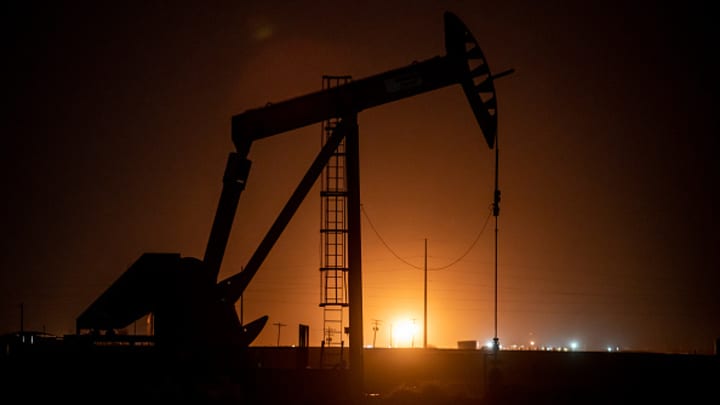
A landmark agreement to shift away from fossil fuels thrusts U.S. policy into the global spotlight, with campaigners demanding that President 's administration should lead the charge toward cleaner energy technologies.
For the first time in nearly three decades, government ministers from nearly 200 countries on Wednesday that calls on countries to move away from using fossil fuels — .
The agreement, known as the global stocktake, was hailed as "historic" by COP28 President Sultan al-Jaber during his closing speech. The European Union welcomed what it described as "the beginning of the end" of the fossil fuel era.
But civil society groups and scientists were left by the absence of an explicit call to phase out or phase down fossil fuels, while a bloc of small island nations criticized what they characterized as a "litany of loopholes."
A "phase-out" commitment would likely have required a shift away from fossil fuels until their use is eliminated, while a "phase-down" agreement would have indicated a reduction in their use — but not an absolute end.
U.S. climate envoy John Kerry said Wednesday that the COP28 agreement "sends very strong messages to the world."
"Today, I would join with ... the Chinese delegation in announcing that the United States and China ... based on the many initiatives set out in the global stocktake decisions, we will again update our long-term strategies, and we invite other parties to join us in doing so," Kerry added, without disclosing the details of these strategy adjustments.
His comments come at a time when the U.S. position as the world's leading oil and gas juggernaut has strengthened in recent months, and the nation is on track to extract more oil and gas than ever before in 2023.
The U.S. Energy Information Administration recently that American oil output hit a fresh all-time high of 13.2 million barrels per day in September, more than heavyweight producers such as OPEC kingpin Saudi Arabia and non-OPEC leader Russia.
"The COP28 deal ultimately signals to policymakers, both in the US but also globally, that the grounds have begun to shift on the outlook for fossil fuel use between now and 2050," Jason Bordoff, director of the Center on Global Energy Policy at Columbia University, told CNBC via email.
"In the US, we need to move more quickly to implement the Inflation Reduction Act, expand clean energy, and begin reducing demand for fossil fuels," he added.
"Even as US oil and gas production breaks records, the signal should be clear that producers need to plan for a future of declining demand, as well as move much more quickly to curb methane emissions."
Jean Su, acting co-executive director at the Center for Biological Diversity, a nonprofit, said Wednesday that the COP28 deal must now be taken up at the national level — and singled out the need for the U.S. to lead the charge.
"The fight to end oil, gas and coal must now be taken up at the country level with the United States leading the way by halting new fossil fuel project approvals and setting a strong nationally determined contribution for next year's COP29," Su said.
Nikki Reisch, director of the climate and energy program at the Center for International Environmental Law, echoed this view.
"So long as the biggest polluters, the United States chief among them, continue recklessly expanding oil and gas and staunchly refusing to provide climate finance on anything approaching the scale needed, the world will remain on a death course," Reisch said.
"Ultimately, lives depend not on what countries profess in these halls, but what they do outside of them," she added.
A White House spokesperson was not immediately available to comment.
The Biden administration has sought to ramp up oil production even as the country seeks to accelerate its transition toward renewable energy sources, in an attempt to keep a lid on prices at the pump — historically, a hot-button issue for U.S. voters.
Shortly after Russia launched its full-scale in February 2022, for instance, U.S. Energy Secretary Jennifer Granholm called on energy executives to raise output to help stabilize the market and " " to American families.
Under Biden, the U.S. passed the most aggressive climate investment ever taken by Congress, a bill known as the . The deal is expected to funnel billions of dollars into programs designed to accelerate the country's energy transition and slash the country's planet-warming emissions by about 40% this decade.
Biden has previously that anyone willing to deny the impact of climate change "is condemning the American people to a very dangerous future," adding that natural disasters in America caused $178 billion in damages last year alone.
"The impacts we're seeing are only going to get worse, more frequent, more ferocious, and more costly," Biden said on Nov. 14.
Nonetheless, the White House has frequently over its plans to expand oil and gas production.
Speaking to the at the COP28 summit earlier this month, Kerry defended the country's surge in its production and maintained the U.S. was a global climate leader.
"As the world puts these collective goals into action, richer nations like the United States have a responsibility to take the lead in quickly moving away from fossil fuels and providing scaled-up climate finance for developing countries," said Rachel Cleetus, policy director and a lead economist at the climate and energy program at the Union for Concerned Scientists, a nonprofit group.
"Without that, we will not be able to succeed in phasing out fossil fuels — which remains essential — nor will we deliver justice for people on the frontlines of the climate crisis," Cleetus said Wednesday.
— CNBC's Ruxandra Iordache contributed to this report.



